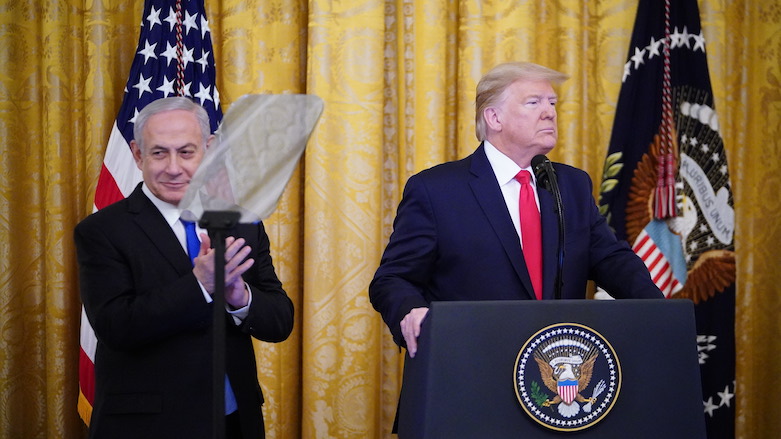US unveils peace plan: embraced by Israel, but rejected by Palestinians

WASHINGTON DC (Kurdistan 24) – On Tuesday, US President Donald Trump announced a new plan for peace between Israel and the Palestinians. Trump provided rough outlines of the proposed deal at a joint noon-time press conference, along with visiting Israeli Prime Minister, Benjamin Netanyahu.
While Trump’s diplomacy was embraced by Israel, it was almost immediately rejected by the Palestinians. Mahmoud Abbas, the 84-year-old head of the Palestinian Authority, called the proposal “the slap of the century.” Speaking to representatives of the Palestinian factions, including Hamas and Islamic Jihad, Abbas affirmed, “We say a thousand times: no, no, and no to the ‘deal of the century.’”
Trump’s son-in-law, Jared Kushner, a New York businessman and a novice diplomat, played a leading role in drawing up the US proposal. And as Trump affirmed: “This vision for peace is fundamentally different from past proposals.”
Indeed, the 80-page plan goes significantly further than previous US peace proposals in accommodating key Israeli positions.
It provides for Israel’s continued security control over the Jordan Valley and leaves in place all Jewish settlements on the West Bank—which over 700,000 Israelis now call home.
For the Palestinians, the plan provides for an independent state and a freeze, over the next four years, in Israeli construction in those areas that are designated for that state—in effect, giving the Palestinians a deadline for accepting negotiations.

Trump also affirmed that the plan would provide very significant economic benefits for the Palestinians and “deliver a massive commercial investment of $50 billion.”
“Over the next 10 years, if executed well,” he stated, “one million great new Palestinian jobs will be created. Their poverty rate will be cut in half.”
Regional Response
Addressing Netanyahu, who was standing at his side, Trump affirmed, “You’re going to have tremendous support from your neighbors and beyond your neighbors.”
Three Arab envoys – the ambassadors from Bahrain, Oman, and the United Arab Emirates – were in the audience, as the plan was announced. The growing threat from Iran has brought Israel closer to many Arab countries, including Saudi Arabia.
Riyadh had positive words for the US proposal. “The Kingdom reiterates its support for all efforts aimed at reaching a just and comprehensive resolution to the Palestinian cause,” Saudi Arabia’s Ministry of Foreign Affairs said.
Similarly, Egypt, which concluded a peace treaty with Israel in 1979, issued a statement, saying it “appreciates the continuous efforts exerted by the US administration to achieve a comprehensive and just settlement of the Palestinian issue, thereby contributing to the stability and security of the Middle East, ending the Palestinian-Israeli conflict.”
However, Jordan, where Palestinians constitute a majority of the population, rejected the US proposal, asserting that only a settlement based on the lines that existed prior to the 1967 Arab-Israeli war was acceptable.
A statement from Turkey’s Foreign Ministry was even more critical, denouncing “the so-called US peace plan” as “stillborn.”
“This is an annexation plan aiming to destroy the two-state solution and seize the Palestinian territories,” the Turkish statement continued. “The people and the land of Palestine cannot be bought off.”
Tehran also denounced the US proposal. “The shameful peace plan imposed by America on the Palestinians is the treason of the century and doomed to fail,” Iran’s Foreign Ministry said.
A Russian Role?
Netanyahu has cultivated close relations with Russian President Vladimir Putin, and Netanyahu’s office announced on Tuesday that he would fly on Wednesday from Washington to Moscow to update the Russian leader “on regional developments and the Deal of the Century.”
The two leaders will meet on Thursday. In addition to the US peace plan, they will discuss two other issues. One is the release of a 26-year-old Israeli-American backpacker, detained in Russia in April for transporting a small amount of marijuana. When Putin visited Israel last week for the Fifth World Holocaust Forum, he indicated that Russia was prepared to release her.
Additionally, Moscow is involved in a legal conflict over property in Jerusalem’s Old City, known as “Alexander’s Courtyard.” It includes a church built on land purchased in the 19th century by Tsar Alexander II. Two branches of the Russian Orthodox Church have been in dispute over ownership, and it is expected that the branch favored by Putin will be granted title.
Editing by Karzan Sulaivany
